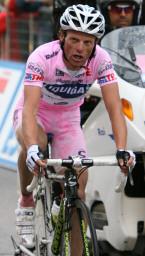Last year's Giro d'Italia winner Danilo Di Luca is facing a two-year ban because of the suspiciously low level of hormones found in his body after he won the Giro's toughest stage.
Italian Olympic Committee (CONI) doping prosecutors on Wednesday asked Italian sport's ultimate arbiter, the Judge of Last Instance, to impose the penalty after long tests on a surprise urine sample taken after the Giro's 17th stage.
Di Luca effectively won the Tour on that stage, a long struggle up Mt Zoncolan, the steepest climb in European cycling.
According to news reports, Di Luca, 32, had hormone levels normally associated with those of a child.
Italian authorities wanted to determine whether the abnormal results were the natural consequence of racing at a high level for three weeks, or some kind of masking agent.
Di Luca's lawyer said his client would eventually be proven innocent - but ''only after his professional life has been irremediably scarred''.
The lawyer claimed that tests on the urine sample have been ''contradictory''.
Di Luca is currently appealing a three-month ban imposed in a separate case.
The shorter ban was inflicted because of the rider's long-standing links to an Italian doctor suspected of providing performance-enhancing drugs.
The Abruzzo-born rider has taken that case to the sporting world's ultimate appeals tribunal, the Court of Arbitration for Sport (CAS) in Lausanne.
He has also threatened to take legal action because the ban - which he has just served out - prevented him from winning last season's ProTour competition.
The doctor, Carlo Santuccione, has been implicated in the notorious Oil for Drugs investigation. Di Luca has known Santuccione, his former family doctor, since he was eight.
Italian sports prosecutors also say Santuccione gave drugs to several other cyclists as well as former world pole vault champion Giuseppe Gibilisco, who received a two-year ban in October.
DI LUCA LATEST IN LONG STRING OF CASES.
Di Luca's case is the latest blow to the credibility of a sport that has been ravaged by scandals in recent years.
This year's pre-Tour favourites, Ivan Basso of Italy and Germany's Jan Ullrich, were forced to pull out before the race because of their involvement in a Spanish doping probe.
Basso, the 2006 Giro winner, subsequently received a two-year ban while Ullrich retired from the sport.
The rider who took over the favourite's mantle, Alexandre Vinokourov of Kazakhstan, went on to test positive for blood doping near the end of the race and faces a two-year ban.
He was one of three riders pulled from the 2007 race for doping including race leader Michael Rasmussen of Denmark.
Italy's Cristian Moreni got a two-year ban after testing positive for the male sex hormone testosterone after the 11th stage of the race.
The 2006 Tour winner, Floyd Landis of the USA, was stripped of his title and banned for two years after tests found an excessive testosterone level during a race stage.
Fellow American Tyler Hamilton, the 2004 Olympic winner, received a two-year ban for blood doping in 2005.
Doping's most illustrious, and ultimately tragic, victim was Italy's Marco 'the Pirate' Pantani.
Pantani's career peaked when he won the Tour and the Giro in 1998, emulating legends like Fausto Coppi and Gino Bartoli - only to take a downturn into doping scandals when he was thrown off the 1999 Giro on the eve of winning it again.
After several aborted comebacks that disappointed his legions of fans, he died of a cocaine overdose in 2004.













